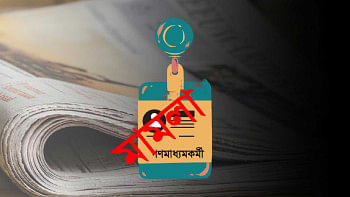Open separate window to disburse loans among CMSMEs
The government should allow more time to cottage, micro, small and medium enterprises (CMSMEs) to secure loans from its stimulus packages to expedite the sector's recovery, speakers said yesterday.
"CMSMEs are considered as the lifeblood of employment and, to a great extent, the overall economy," said former Bangladesh Bank governor Atiur Rahman, adding that a separate channel or window should be opened to facilitate disbursements for the sector.
Rahman was speaking at a virtual meeting styled, 'Constraints and Prospects of Industrial Policy', organised by the Dhaka Chamber of Commerce and Industry (DCCI).
The actual size of the fund available for CMSMEs is Tk 30,000 crore, but little over Tk 7,000 crore has been released so far as many banks are uninterested in providing loans to small businesses.
Therefore, the December 31 deadline for disbursements for CMSMEs should be extended while the two-year loan recovery period should be lengthened as well.
The CMSME sector's contribution towards employment is still hovering around 20 per cent even though it was expected to reach 25 per cent by this time.
"This is because there is an unfortunate lack of technological adaptability in the sector," he added.
The former governor also said a second round of stimulus should be considered for the garments industry to help pay the wages and allowances of its workers.
CMSMEs are still informal in Bangladesh, but units that are entering the formal sector have great potential to contribute to the national economy by creating employment opportunities.
So, the government should aim to facilitate growth in the sector in a bid to harness this potential, Rahman said.
Bangladesh Bank should also make it easier for entrepreneurs from the e-commerce and f-commerce sectors to avail small loans. At the same time, their registration certificate with any trade body should be considered as a trade licence since making actual trade licences is difficult for them, he added.
Industries Minister Nurul Majid Mahmud Humayun, various policymakers, government officials, business chamber leaders and researchers participated in the discussion, moderated by DCCI President Shams Mahmud.
Abu Eusuf, a professor of the department of development studies at the University of Dhaka, presented a keynote paper.
Kazi Khaliquzzaman Ahmed, chairman of the Palli Karma Sahayak Foundation (PKSF), said there are 80,000 small-and-medium enterprises (SME) operating across the country.
Those units are financially stronger compared to the cottage and micro units as they employ more than 300 workers on an average and have banking facilities.
However, there are more than one crore units of cottage and micro-enterprises across Bangladesh that employ more than 2.5 crore people.
But due to the Covid-19 fallout, most of them are in dire straits as they are not financially capable as small-and-medium units, Ahmed said.
Considering the situation, the PKSF chief also suggested that a separate channel should be formed for cottage and micro-enterprises to secure adequate funds from the stimulus packages in a timely manner.
Md Masudur Rahman, chairperson of the SME Foundation, said his foundation has been working to redefine SMEs, mainly to bring more small-scale enterprises to the sector so that they can also get various banking facilities.
Broadening the definition of SMEs will resolve many challenges faced by the sector, he said, adding that SMEs account for nearly 60 per cent of the GDP in many countries.
In Bangladesh, for example, there are thousands of small-scale jute exporters. Still, they do not get incentives as the existing policy states that only exporters with manufacturing capabilities are eligible for incentives.
The SME Foundation is also working on this issue, Rahman said.
Only 5 per cent of the over 1 lakh small-scale entrepreneurs in the country are women, which indicates the poor participation of female entrepreneurs in the SME sector, he added.
In his welcome remarks, DCCI President Shams Mahmud said in fiscal 2019-20, the industrial sector's contribution to GDP was 35 per cent, a 6.48 per cent increase compared to the year before.
Over the last three decades, Bangladesh's industrial growth was mainly centred on garments, which needs diversification.
One of the main constraints for an SME is the lack of access to low-cost financing, even in the case of loans under the government's stimulus packages, Mahmud added.
Industries Minister Humayun agreed that bank accounts or registration certificates with any trade body should be considered as a trade licence to ease the process.
The government has been planning to disburse loans through an alternative channel for CMSMEs, he said. He advocated broadening the SME definition.
Bangladeshi companies should be allowed to acquire firms from any sector in other countries so that they can simultaneously acquire the technologies used by that company, said former DCCI President Abul Kasem Khan.
For instance, India's Tata Group bought the Land Rover company. Similarly, Bangladeshi business people should be able to buy a tea garden in Sri Lanka, he said.
Khan also said that making licences and eventually having to renew them is a very expensive process that only increases the cost and complexities of doing business.
So instead, only the bank account and registration of any company with any trade body should be considered as a trade licence, Khan said.

 For all latest news, follow The Daily Star's Google News channel.
For all latest news, follow The Daily Star's Google News channel. 



Comments